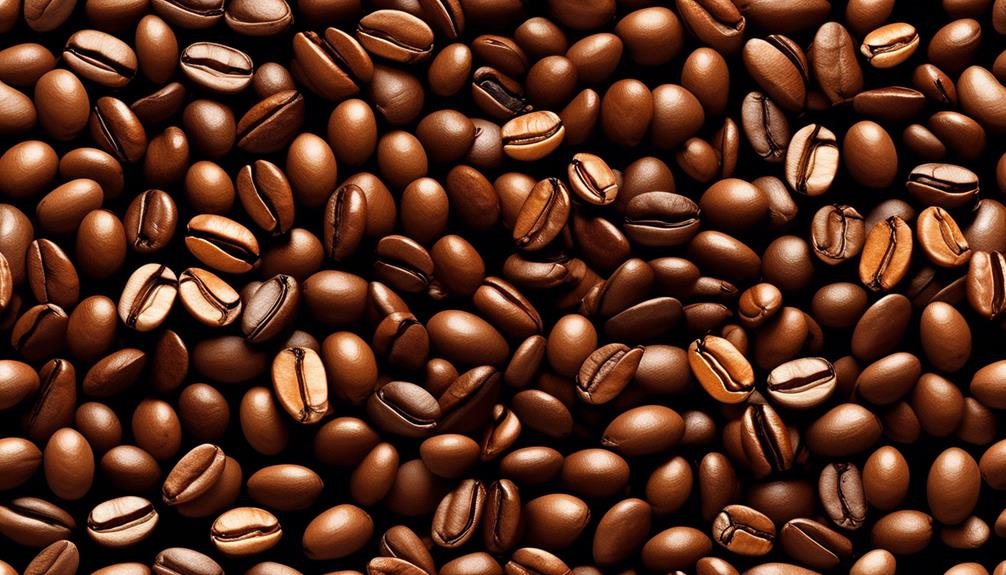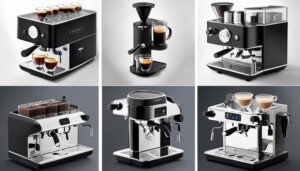Did you know that specialty grade coffee represents only about 10% of the global coffee market? That means the majority of coffee consumed falls into the commercial grade category.
But what exactly is the difference between specialty grade and commercial grade coffee? Why is one considered higher quality than the other?
In this discussion, we will explore the distinctions between these two grades of coffee and delve into the factors that contribute to their varying taste and aroma profiles.
So, if you're curious to learn how to choose the right grade of coffee for your preferences, keep reading to discover the nuances of specialty and commercial grade coffee.
Key Takeaways
- Specialty grade coffee represents a smaller portion of the global coffee market, but is known for its high quality and meticulous cultivation processes.
- Commercial grade coffee, on the other hand, is produced on a larger scale to meet high demand and is often made from a blend of different coffee beans.
- Factors such as altitude, bean type, and processing method all contribute to the overall quality and flavor profile of coffee.
- Specialty grade coffee offers complex and nuanced flavors, with a symphony of notes, while commercial grade coffee tends to have a more generic taste profile. Additionally, specialty coffee has a rich and inviting aroma, while commercial coffee may have a faint or dull aroma.
What Is Specialty Grade Coffee?
Specialty grade coffee is the highest quality of coffee beans available, known for its exceptional taste, unique flavors, and meticulous cultivation processes. These beans are grown in specific regions around the world, under ideal climatic conditions and at high altitudes. The farmers who cultivate specialty grade coffee are true artisans, dedicated to producing the best possible beans. They employ sustainable farming practices, carefully selecting the ripest cherries by hand and ensuring that only the highest quality beans make it to the market.
What sets specialty grade coffee apart is the rigorous grading system it undergoes. The beans are evaluated based on their size, shape, color, and defects. Only beans with a score of 80 or above, out of a possible 100, are considered specialty grade. This ensures that every cup of specialty grade coffee you enjoy is of the utmost quality.
The flavor profile of specialty grade coffee is diverse and complex. From fruity and floral notes to rich chocolate and nutty undertones, each cup offers a unique and unforgettable experience. The attention to detail in every step of the cultivation and processing process results in a coffee that's unparalleled in taste and aroma.
When you choose specialty grade coffee, you aren't only indulging in a superior taste experience but also supporting the farmers who work tirelessly to bring these exceptional beans to your cup. So, take a moment to savor the flavors of specialty grade coffee and appreciate the dedication and craftsmanship that goes into every sip.
What Is Commercial Grade Coffee?
Commercial grade coffee, while not reaching the same level of quality and craftsmanship as specialty grade coffee, still offers a satisfying and accessible option for coffee enthusiasts. Although it may not have the unique flavor profiles and distinct characteristics of specialty coffee, commercial grade coffee provides a consistent and familiar taste that many people enjoy.
Here are three key aspects to understand about commercial grade coffee:
- Mass production: Commercial grade coffee is typically produced on a large scale, with the aim of meeting high demand. This often involves the use of mechanized processes and techniques that prioritize efficiency over individual attention to each bean. As a result, commercial grade coffee may lack the nuanced flavors that specialty coffee is known for.
- Blend of beans: Commercial grade coffee is often made from a blend of different coffee beans, which allows for a more consistent taste profile. This blending process helps to create a balanced and reliable flavor that appeals to a wide range of palates. However, it also means that the unique characteristics of individual beans may be masked, resulting in a less complex cup of coffee.
- Lower cost: Compared to specialty grade coffee, commercial grade coffee is generally more affordable. This accessibility makes it a popular choice for everyday consumption, as it provides a reliable and cost-effective option for those who enjoy a regular cup of joe. While it may not offer the same level of complexity and quality as specialty coffee, commercial grade coffee can still be a satisfying choice for coffee lovers looking for a familiar and accessible option.
Factors That Determine Coffee Grade

There are several key factors that play a crucial role in determining the grade of coffee. These factors include the altitude at which the coffee is grown, the type of bean, the processing method, and the overall quality of the beans.
Altitude is an important factor because coffee beans grown at higher elevations tend to have a more desirable flavor profile. The cooler temperatures and higher oxygen levels at higher altitudes slow down the maturation process of the coffee cherries, resulting in a more complex and flavorful cup of coffee.
The type of bean also plays a role in determining coffee grade. Arabica beans are generally considered to be of higher quality than Robusta beans. Arabica beans have a sweeter, more nuanced flavor, while Robusta beans tend to be more bitter and have a higher caffeine content.
The processing method is another crucial factor. The way the coffee cherries are processed after they're harvested can greatly impact the final flavor of the coffee. Methods such as washed processing or natural processing can enhance or detract from the overall quality of the beans.
Lastly, the overall quality of the beans is determined by factors such as size, shape, and color. Beans that are uniform in size and shape and have a rich, vibrant color are generally considered to be of higher quality.
Taste and Aroma Differences Between Specialty and Commercial Grade Coffee
After understanding the factors that determine coffee grade, it's time to explore the remarkable differences in taste and aroma between specialty and commercial grade coffee.
Specialty grade coffee, with its meticulous cultivation and processing, offers a truly exceptional taste and aroma experience. Here are three key differences that set it apart from commercial grade coffee:
- Taste: Specialty grade coffee is known for its complex and nuanced flavors. Each sip reveals a symphony of notes, ranging from fruity and floral to nutty and chocolatey. The taste is vibrant, well-balanced, and often described as clean and bright. Commercial grade coffee, on the other hand, tends to have a more generic and one-dimensional taste profile, lacking the depth and complexity found in specialty coffee.
- Aroma: The aroma of specialty grade coffee is intoxicating. As you inhale, you may detect the enticing scents of berries, citrus, caramel, or even spices. The aroma is rich, inviting, and can be just as enjoyable as the taste itself. In contrast, commercial grade coffee may have a faint or dull aroma, often lacking the distinct and captivating fragrances found in specialty coffee.
- Aftertaste: Specialty grade coffee leaves a lasting impression with its delightful aftertaste. You may experience a lingering sweetness, a pleasant acidity, or a satisfying smoothness. The aftertaste of commercial grade coffee, however, is often short-lived and unmemorable.
How to Choose the Right Grade of Coffee for Your Preferences

To ensure that you select the perfect grade of coffee to suit your preferences, it's important to consider a few key factors.
Firstly, think about the flavor profile you enjoy. Specialty grade coffee is known for its distinct and complex flavors, whereas commercial grade coffee tends to have a more generic taste. If you appreciate a wide range of flavors, from fruity and floral to nutty and chocolatey, then specialty grade coffee is the way to go. On the other hand, if you prefer a simpler, more straightforward taste, commercial grade coffee might be more suitable for you.
Another factor to consider is the level of quality you desire. Specialty grade coffee undergoes a rigorous grading process to ensure that only the highest quality beans make it to your cup. This means that you can expect a consistently excellent brew every time. Commercial grade coffee, on the other hand, may vary in quality and consistency.
Lastly, think about your budget. Specialty grade coffee is often more expensive due to its superior quality and the care taken in its production. If you're willing to invest a bit more for a truly exceptional cup of coffee, then specialty grade is worth considering. However, if you're working within a tighter budget or simply prefer a more economical option, commercial grade coffee may be more suitable.
Frequently Asked Questions
What Are Some Common Misconceptions About Specialty Grade Coffee?
You might be surprised to learn that specialty grade coffee is not just about the taste. Many people mistakenly believe that it's all about the flavor, but there's so much more to it.
How Does the Production Process Differ Between Specialty and Commercial Grade Coffee?
The production process for specialty grade and commercial grade coffee differs in several key ways. Specialty grade coffee is carefully cultivated and processed with a focus on quality, while commercial grade coffee is often mass-produced with less attention to detail.
Are There Any Health Benefits Associated With Specialty Grade Coffee Compared to Commercial Grade Coffee?
Specialty grade coffee offers potential health benefits compared to commercial grade coffee. These benefits can include higher antioxidant levels and lower levels of contaminants. So, if you're looking for a healthier option, specialty grade coffee may be the way to go.
Can Specialty Grade Coffee Be Found in Supermarkets or Is It Only Available in Specialty Coffee Shops?
Specialty grade coffee can be found in supermarkets, not just specialty coffee shops. It's important to look for specific labeling or brands that indicate specialty grade. Explore the world of specialty coffee at your local grocery store!
What Impact Does the Coffee Grading System Have on the Pricing of Specialty and Commercial Grade Coffee?
The coffee grading system plays a crucial role in determining the price of specialty and commercial grade coffee. Understanding this system helps you appreciate the effort and quality that goes into specialty coffee, making it worth the higher price.
Conclusion
In conclusion, the difference between specialty grade and commercial grade coffee lies in the quality and taste. Specialty grade coffee is carefully selected and roasted to highlight its unique flavors and aromas, while commercial grade coffee is often mass-produced and lacks the same level of attention to detail.
Choosing the right grade of coffee ultimately depends on your personal preferences and how much you value the nuances and complexity of specialty coffee. So, whether you prefer a bold and consistent cup or a more nuanced and flavorful experience, the choice is yours.




